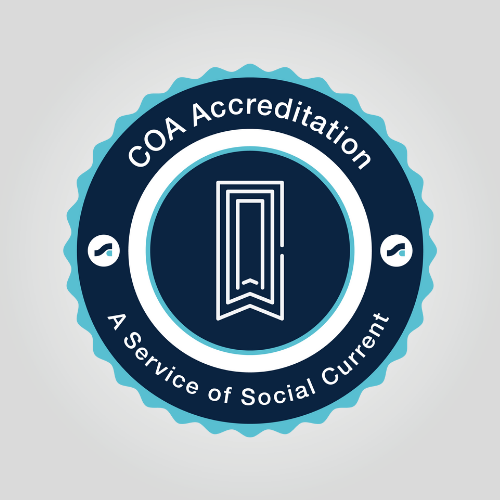Profiles in Accreditation: Rose Brooks Center
Welcome to the Council on Accreditation (COA) blog post series Profiles in Accreditation!
The organizations that COA accredits are diverse in both the communities they serve and their reasons for seeking accreditation (or reaccreditation). Profiles in Accreditation will explore the accreditation experience through the perspective of these organizations. Through them, we can discover the value of accreditation, best practices, lessons learned, and recommendations.
Organization profile
Name: Rose Brooks Center
Location: Kansas City, Missouri
First accredited: 2018
Snapshot:Rose Brooks Center is a domestic violence agency serving the Kansas City Metro-Area. Its mission is to break the cycle of domestic violence so that individuals and families can live free of abuse.
Rose Brooks Center services include a 24 hour crisis hotline; a 100-bed emergency shelter for adults, children, and their pets; individual and group therapy services; a supported recovery program; advocacy services co-located within 5 hospital systems, civil and criminal courts, and the police department; a rapid re-housing program; residential and non-residential case management services; employment and economic advocacy; a school-based violence prevention program serving over 30 local schools; and community training and education.
Interview with Rose Brooks Center
For this Profiles in Accreditation post, we asked Chief Operating Officer Lisa Fleming to share her experience heading up the accreditation process at an agency becoming accredited for the first time. Lisa emphasized how accreditation has enhanced Rose Brooks Center’s quality improvement and risk management processes, and how the hard work of the Self Study can pay off.
COA: Why was seeking accreditation important for your organization?
LF: For several years, Rose Brooks Center had the goal of obtaining accreditation in our strategic plan. We were fortunate to have a local funder, the Jackson County Community Mental Health Fund, that offers agency capacity-building grants for improving mental health outcomes. Specifically, they provide funding to grantees to pay for accreditation fees. Since the early 90’s, the Mental Health Fund has provided Rose Brooks Center with leadership and guidance in using outcome data and quality assurance indicators to make improvements to our funded programs. Their capacity-building grant helped to ensure we moved to the next level of fully implementing best practice standards and building out our quality improvement process.
We recognized that accreditation would be the next step for ensuring quality services. It would also be important to sustaining a culture of quality improvement. While we had general policies and procedures in place for agency operations, we knew we would benefit from the structure and researched best practice standards offered by COA.
In addition, we have benefited from the institutional knowledge of several agency leaders who have been here for twenty or more years. As we planned for the next five to ten years, we knew that there needed to be a way of transferring this institutional knowledge and formalized processes for ensuring quality.
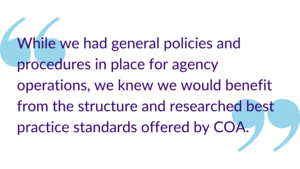
COA: What about the COA accreditation process made you decide to partner with us?
LF: There were several factors that influenced our decision to partner with COA. First, the COA process includes standards specialized for domestic violence services and emergency shelter operations. These standards reflect guiding principles of trauma-informed care and the standards set forth by our state domestic violence coalition.
Two of our local domestic violence agency partners had also selected COA and highly recommended COA. We benefitted from their lessons learned and work product as we conducted our Self-Study. We hope to pay it forward to another domestic violence program considering COA.
The consultation with our Accreditation Coordinator was a benefit that was not originally factored into our decision, but certainly was one that was extremely helpful and valuable to our self-study process. We always highlight this service to other agencies who are in the process of selecting an accreditor.
COA: Were there any unexpected results after completing the Self Study and Performance and Quality Improvement (PQI) process?
LF: The level of staff participation throughout the Self Study and ongoing PQI process has exceeded our expectations. It has been a valuable and effective way to instill a culture of improvement throughout the agency, and it has offered a professional development opportunity for staff who have an interest in program management. Recently, a PQI Team member expressed her interest in being a full time PQI Coordinator if the position was ever created. It was a result affirming our original goal of sustaining a culture of improvement.
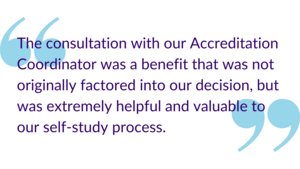
COA: How did you engage and communicate the value of accreditation to the entire organization during the accreditation process?
LF: We used many of the Intensive Accreditation Training and Performance and Quality Improvement Tool Kit documents to train staff, agency leadership, and the board. At our first staff training we used the Culture of Improvement document, and staff shared examples of Rose Brooks Center practices that supported each component of a culture of improvement. The activity and document helped connect staff to the things they do on a regular basis but may not have considered to fit with the more formal definition of Performance and Quality Improvement. We did a similar presentation with our board to share the benefits of accreditation, explain the self-study process, and train on the new or updated policies and procedures.
COA: What do you see as the main benefit of COA accreditation?
LF: COA accreditation sustains a foundation of research-based best practices throughout our organization. This helps to ensure that our agency achieves our intended outcome goals, exceeds our indicators for service delivery quality and safety, and manages agency operations with the highest degree of ethical and fiduciary standards. The accreditation process and resulting new or updated policies and procedures continually inform and guide our program development and improvement, training and professional development, risk prevention and management activities, and overall agency capacity building activities.
COA: What about the accreditation process do you feel was most valuable to your organization?
LF: Establishing routine and formalized processes for agency-wide performance and quality improvement and risk prevention and management that will be sustained long-term. Concurrent to the self-study process, our agency has continued to work on succession planning and staff professional development. Several staff with over 20 years of institutional knowledge will retire within the next 5 to 10 years. The accreditation process has been incredibly effective in transferring the institutional knowledge, expertise, and processes that have resulted financial stability and quality services to the next generation of leaders.
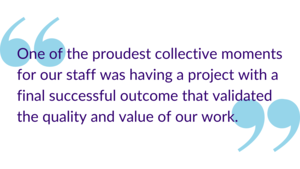
COA: What did you like most about the accreditation process?
LF: One of the proudest collective moments for our staff was having a project with a final successful outcome that validated the quality and value of our work. Seeing the volume of evidence describing all that staff do on a daily basis was a pretty great feeling.
We appreciate having the researched-based standards offered by COA, as well as the flexibility and empowerment to create agency procedures that can both fulfill the requirements of the standards and be customized to meet the unique needs our workforce and the people we serve.
COA: What was the biggest challenge during the accreditation process?
LF: Managing a full time position while working a project that could in itself be a full time job position. It’s worth it. But it’s a lot. Thankfully, I had a great team of supervisors and staff to help with the project. We also appreciated the help from Sabrina (our Accreditation Coordinator) in determining a reasonable timeline for completion.
COA: How has COA accreditation/reaccreditation impacted operational success?
LF: COA accreditation has formalized our Performance and Quality Improvement (PQI) and risk prevention and management processes. In turn, we have been able to include these up-to-date recommendations and improvement needs into multiple grant proposals. The monitoring and improvement processes provide our grant writers with timely, detailed, and substantiated Statement of Need for a wide variety of local, state, federal, and foundation grants. We have been awarded funding for program enhancements, staff training, equity and inclusion consultation services, facility and security improvements, and client supplies using PQI and risk prevention and management data.
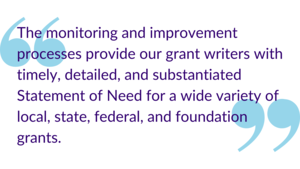
COA: What are the top three pieces of advice or tips that you would give to an organization considering or currently undertaking the accreditation process for the first time?
LF:
1. Use the tools, documents, training, and consultation offered by COA. Our monthly meetings with our Accreditation Coordinator, Sabrina, were extremely helpful to increasing our understanding of the standards and thinking through what needed to be developed or what existing procedure could be adapted to fit with a standard. They were also a reassurance that COA’s goal was to help us successfully achieve accreditation.
In addition, I would also recommend sending the staff person with the primary responsibility for coordinating the self-study to the in-person Intensive Accreditation and the Performance and Quality Improvement training offered by COA.
2. Reach out to another similar agency who has gone through COA’s self-study and site visit process. Most are very willing to share their policies and procedures. It can really help you get past a “writer’s block” and get you started. Likely they can help re-assure you about the process and its benefits.
3. Designate a leader and a team that has an expansive and detailed knowledge of agency operations to coordinate the self-study process. At first we hired a consultant to do the coordination, but the volume of concurrent projects, processes to be developed, and constant communication proved challenging for an external position. For our agency, it worked best to have the COA Coordinator (our Chief Operating Officer) develop a timeline and document checklist using the COA tools. The COA Team, comprised of program directors and the Executive Team, met at least monthly to review progress. Program directors involved their team members to update or create program-specific procedures.
COA: Are there any other learnings or insights that you’d like to share?
LF: Personally, the self-study process was one of the most challenging projects I have worked on in my 28 years at Rose Brooks Center. It is also one that I take the most pride in having led. As an Executive Team, it has given us increased confidence that the culture of improvement and our commitments to safety, quality, trauma informed- care, and equitable and inclusiveness will be sustained.
Thank you, Rose Brooks Center!
We would like to thank Lisa for her thoughtful insights into the first-time accreditation process and acknowledge the entire Rose Brooks Center board and team for embracing accreditation and collectively contributing to the promotion of best practices. Thank you, all!
Do you have a COA accreditation story to tell? Click here to share it. You could be the next organization we feature!



